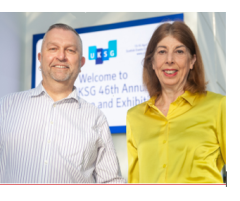It seems such a long time since our last editorial in the late autumn of 2023, and, since then, many of us in the northern hemisphere have endured the hardships of the winter months. Christmas has come and gone (for those who celebrate it), and we are already powering at pace through 2024. It’s March already, and for those lucky enough to attend each year, the UKSG Annual Conference will be taking place once again in Glasgow in early April, so we are looking forward to seeing many of you there.
The editorial board of Insights has continued to work at pace and with great gusto behind the scenes to bring you a steady flow of research articles, opinion pieces and scholarly insights to help you navigate and understand the ever-changing world(s) of scholarly communications. We continue to seek out authors and topics that reflect the breadth and depth of our community.
From the academic sector, we have brought you Julie Baldwin and Paul Cavanagh’s article When will we be transformed?, which reflects on the University of Nottingham’s experiences of working with transformative agreements, their development of a cross-library working group, and the shift in institutional decision-making procedures. We have most recently published Lisa Bird and James Barnett’s article entitled Developing text and data Mining (TDM) support within a university research library, which explores the partnership between the Copyright and Licensing Team and the University of Birmingham’s Research Infrastructure Team. The article also looks at issues impacting on supporting TDM and the results of a TDM survey. We look forward to bringing you a thought-provoking article by Beth Montague-Hellen, which challenges libraries and librarians to reconsider the potential of Artificial Intelligence (AI) to proactively support open scholarship. Despite the many concerns being put forward around the application of AI, the article will argue librarians (and publishers) should be actively enabling the use of scholarly research outputs in AI training datasets.
For those with an interest in the scholarly publishing, Marjorie Bardiau and Christophe Dony of ULiège Library at the University of Liège, Belgium brought us a fascinating analysis looking at bibliodiversity and the Journal Impact Factor™ brand, a case study of IF-journals included in the 2021 Journal Citations Report™, which questioned how the drive for prestige and quality through the IF brand poses serious threats to bibliodiversity. Huw Grange took a challenging look at how minority languages are excluded from scholarly publishing and the initiatives which are seeking to address this issue, including the ‘In all languages’ campaign which seeks to challenge Anglophonic hegemony.
Looking forward, we’re excited to be able to bring you Deni Auclair, Jaime Carmichael and Jessica Thibodeau’s article which will explore the challenges and roadblocks to robust metadata in the scholarly communications industry.
As always, we have continued to respond to and explore the changing landscape of open access (OA)/open science. Athanasia Salamoura and Giannis Tsakonas of the University of Patras, Greece took an informed look at the challenges faced by librarians in monitoring OA dashboards in order to ensure a complete view of institutional OA status, ensure accuracy and achieve efficiency in the entire process. They explored the characteristics of various monitoring systems from European countries, including the sources of data, formats, visualization methods, update frequencies, granularity and types of access recorded.
In the coming weeks we will also be bringing you an article by Pasipanodya Ian Machingura Ruredzo, Dominic Dankwah Agyei, Modibo Sangare and Richard F Heller which reports on the results of a recent survey into the current state of open science in public health in Africa, exploring barriers to, and interest in capacity building for open publishing of public health research in Africa among authors, reviewers, editors and publishers.
Looking at the wider scholarly communications landscape, and following on from our recent thought-provoking article by Alice Prochaska, which presented a view of librarianship in times of conflict, we are looking forward to be able to bring you a new article by Christina Dinh Nguyen, entitled The fragile digital bastion: cultural heritage in the crossfire of conflict, which examines the challenges inherent in the preservation of cultural heritage. It will challenge the misconception of invulnerability in digital repositories and reveal their susceptibility to warfare.
As ever, we welcome proposals and suggestions from you, our reader community. Insights remains, at its heart, for you and by you, so please do consider submitting an article. For those who didn’t see it at the time, we recently put out a call for papers which looked for articles on innovation and stories about the projects and initiatives that are identifying new ways to support education and research. That may include sharing innovative approaches to enhancing user experience, sharing how you are embracing artificial intelligence (AI) to meet challenges and leverage opportunities, showcasing projects related to the development and management of digital collections, or telling the community about projects and initiatives which are contributing to the open science movement. This is such a dynamic environment in which we work, and you are all such talented and creative people, so get writing!
Please send in your article suggestions to: insights@uksg.org

